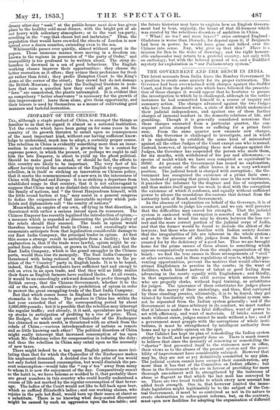JEOPARDY OF THE CHINESE TRADE.
TEA, although a staple product of China, is amongst the things so familiar to us that we regard it almost as a national institution.
Yet the events which have been going on for some years in the country of its growth threaten to entail upon us consequences of the most important kind, without our having sufficient know- ledge to understand, much less to adopt, a certainly proper course. The rebellion in China is evidently something more than an insur- rection to extort concessions; it is growing to be a contest for supreme power, in which the present, or perhaps we ought to call him the late Emperor, is about to yield up the ghost political. Should he make good his stand, or should he fail, the effects to this country are likely to be important. The very fact of his officer having invited the assistance of the English to suppress the rebellion, is in itself so striking an innovation on Chinese policy, that it marks the commencement of a new tiara in the intercourse of China with England and Europe it is so striking a departure from established usage in that country, that it is not extravagant to suppose that China may at no distant date claim admission amongst the family of nations, and "the Great Hanjandram himself, with the little round button at top," may assist in a general congress to define the exigencies of that inscrutable myste7 which pub- licists and diplomatists call "the comity of nations.'
Meanwhile, an empire of our own, off-lying in that direction, is threatened with rather a serious inroad upon its resources. The Chinese Emperor has recently legalized the introduction of opium,— a measure which is regarded as discounting the probable policy of the rebels should they succeed. The trade in opium would therefore become a lawful trade in China ; and exceedingly wise economists anticipate from that legalization considerable damage to our East India Company, the principal trader in opium. At first this seems a strange result to anticipate from a facility; but the explanation is, that if the trade were lawful, opium might be ex-
ported other countries, or grown in China itself, and that the East India Company, which is the grand smuggler in the Chinese ports, would thus lose its monopoly. The East India Company is threatened with being reduced in the Chinese waters to the po- sition of the" Country" party in English lands. It is to be hoped, indeed, that English merchants have sufficient tact and energy to rub on even in an open trade, and that they will as little realize their fears as English farmers have realized theirs. At all events, it would be an exceedingly awkward demand to prefer through the British envoy, that the Chinese Government, whether it be the old or the new, should continue its prohibition of opium in order to protect the great smuggling-trade of the East India Company. But that which comes home in England to men's business and stomachs is the tea-trade. The produce in China has within the last year exceeded that of the corresponding period by about 3,000,000 pounds ; but it is possible that the rebellion may interrupt the regular traffic ; and already, it it said, speculators are buying up stocks in anticipation of profiting by a rise of price. Thus, the Budget, for which our present Chancellor of the Exchequer has obtained so much credit, is threatened with an attack from the -rebels of China ;—ourious interdependence of nations so remote and so little knowing each other ! The political disorders of China nueit really intercept that increased consumption of tea upon whit& Mr. Gladstone relies for compensation in reducing the duty; and thus the rebellion in China may entail upon us the necessity of new taxes.
• There might indeed be a tax upon English patienee more irri- tating than that for which the Chancellor of the Exchequer makes his unpleasant demands. A decided rise in the price of tea would not only forbid increased consumption, but would diminish the pre- sent oonsumption—would take the "cup o' tea" away from many to whom it is now the enjoyment of the day. Comparatively recent as the habit is, we have become so wedded to it, that probably there are great numbers in this country who could hardly understand a course of life not marked by the regular consumption of that bever- age. The ladies of the Court would not like to fall back upon beer, which so sufficed Elizabeth's ladies ; and our working classes, who rejoice in the pale hot fluid, would turn up their noses at claret as a substitute. There is no knowing what deep-seated discontent plight be caused by such an aggression upon the tea-table; and
the future historian may have to explain how an English Govern- ment had to bear, unjustly, the brunt of that ill-humour whioh was created by the rebellious disorders of ambition in China.
"What! no tea ? and more taxes ? " cries outraged England : Gladstone is worse than Disraeli ; for depend upon it, if Benjamin had been in power, he would have gone and talked over the Chinese into sense. Nay, why give up that idea ? There is a mission for Ben in the wake of Bowring ; and the right honour- able ambassador may return to a grateful country, not only with an anthology, but with the beloved pound of tea, and a Buddhist mystery for exploitation in "our Parliamentary system."


























 Previous page
Previous page